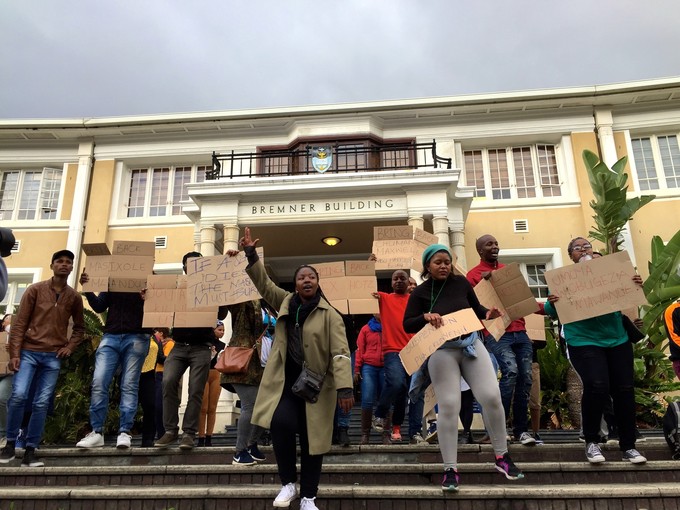UCT and protesters reach agreement
Shackville TRC group undertakes not to disrupt exams, while university grants clemency
Last night an agreement was reached between the management of the University of Cape Town and the student protest groups Shackville TRC and SRC Candidates. The agreement offers clemency to students suspended following the February protests and establishes a commission to investigate past student protests and recommend improvements to the university.
According to the agreement, to gain clemency, suspended students must sign a declaration acknowledging wrongdoing and committing not to repeat similar actions in the future. Clemency can also be revoked if there are further disruptions of exams and academic activities.
The document does not specify the meaning of clemency, however, only stating that signing the declaration “will provide clemency for specific offenses which relate to the protests around February 2016”. In one of these protests, UCT art was burnt, cars were set alight and vice-chancellor Max Price’s office was burnt. A Supreme Court of Appeal decision upheld an interdict against students who were involved in this protest.
The agreement also outlines the responsibilities of a new Institutional Reconciliation and Transformation Commission (IRTC), otherwise known as the Shackville TRC. It will look into the “Shackville protests” of February 2016, as well as related and subsequent protests and, in the case of suspended students, “make recommendations on the granting of amnesties (or the continuation of clemency) and what the nature of these amnesties will be”.
Since the IRTC will be responsible for further investigation of student protests, the agreement places a moratorium on disciplinary tribunals related to the cases of student protesters, pending the recommendations of the IRTC.
The IRTC will also make recommendations to UCT on “institutional culture, transformation, decolonisation, discrimination, identity, disability” and other matters, according to the agreement.
The agreement also commits the university “to examine the possibility and implications of fee-free higher education”, including a research program into economic policy around fee-free higher education and a dedicated unit at the university to engage in debates and lobby at the national level for more higher education funding.
Furthermore, the university will put in place “programs, activities and timeframes on how the concept of decolonisation can be approached by the university community as a whole”.
On the subject of financial difficulty for undergraduate students, the agreement includes a commitment by the executive that students in good academic standing who are on track to graduate but are being prevented due to affordability will be allowed to graduate or progress.
In addition, the agreement commits the university to seeking donor funds to cover fees of those whose studies the National Student Financial Aid Scheme (NSFAS) cannot cover, and to release degrees to students who have had degrees withheld due to an inability to pay debts to the university.
Students may also choose to take their exams in January rather than November, according to the agreement. The university commits to make residences, food and transport available so that students deferring their exams will not be “in an adverse financial position”.
A committee appointed by the university is developing a protocol for the use of private security to be drafted by year end. The agreement states that “if an agreement is reached on these principles which leads to a de-escalation of conflict, the executive is open to removing private security as soon as possible”.
Finally, the agreement establishes a Rapid Response Task Team, made up of representatives from the executive task team and representatives from student groups, to monitor the implementation of the agreement.
Exams started on UCT this morning. When GroundUp visited upper campus, no private security was visible and only one police car was patrolling. Exams appeared to be underway without incident.
Support independent journalism
Donate using Payfast

Don't miss out on the latest news
We respect your privacy, and promise we won't spam you.
Next: University interdicts: what do they mean and to whom do they apply?
Previous: University students help rural learners stay in school
Letters
Dear Editor
I have no doubt that UCT's exams will proceed without violence or intimidation - several of the "leaders" will be writing exams.
I also have no doubt that the current compact will fall apart next year for the following reasons:
1. The SRC candidates, who are "self-identifying" negotiators to the agreement, have no mandate.
2. At least one of the "negotiators" is currently under indictment for at least two criminal offenses, and has unambiguously demonstrated that he was not above violating a prior agreement with the UCT executive.
3. It will not be lost on the "negotiating leaders" that criminal violence, assault to the person and the office of the VC, incitement to criminal violence and criminal intimidation of those not joining their ranks, has won them total victory over a cowed executive and Council. Only the most naive will fail to appreciate that they will resort to identical tactics every time an impasse is reached during the proposed "TRC" negotiations.
4. Given the steady progression from Rhodes must fall, through Fees Must Fall, to, now, free education and "quality, decolonized" education, it is inevitable that new demands will emerge going forward.
© 2016 GroundUp. 
This article is licensed under a Creative Commons Attribution-NoDerivatives 4.0 International License.
You may republish this article, so long as you credit the authors and GroundUp, and do not change the text. Please include a link back to the original article.

